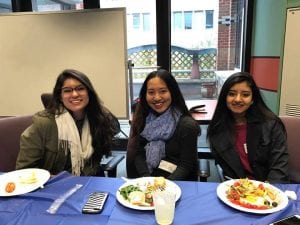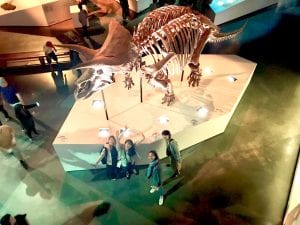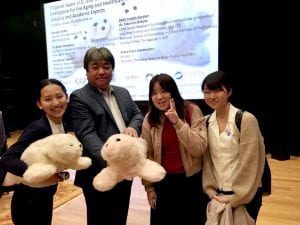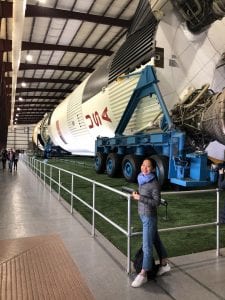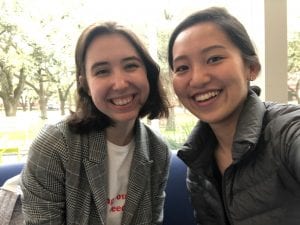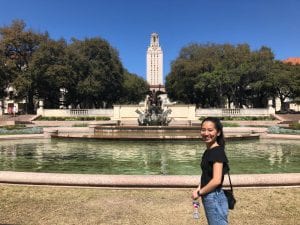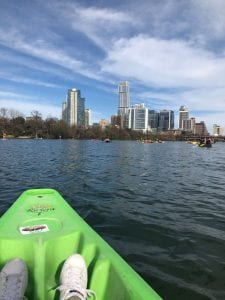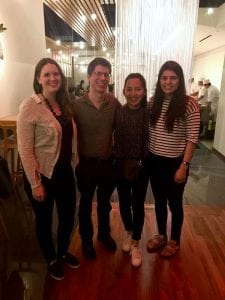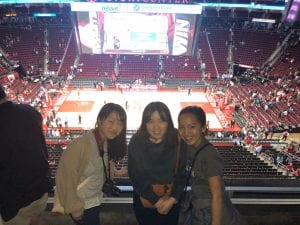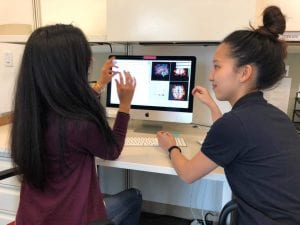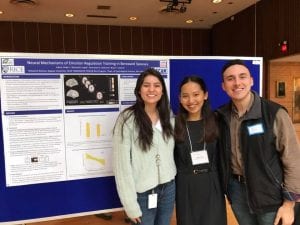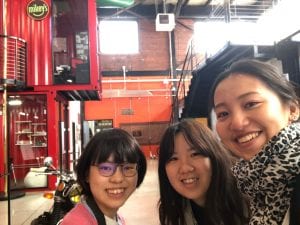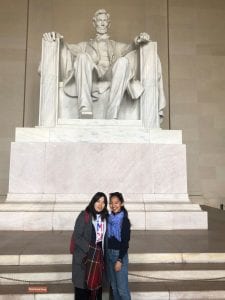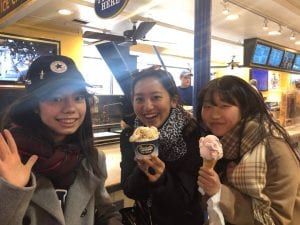[:en] Yukina Chiba
Yukina Chiba
Hometown in Japan: Tokyo
University in Japan: Nagoya University
Major & School Year: Biological Sciences, B3: Junior
Host Advisor: Prof. Bryan Denny, Dept. of Psychological Sciences
Host Lab: Translational Social Cognitive and Affective Neuroscience Lab
Final Research Poster (PDF): “Neural Mechanisms of Emotion Regulation Training in Bereaved Spouses”
2nd Place: “Best Poster Presentation Award”
Why TOMODACHI STEM @ Rice University?
I gasped out of excitement as if I spotted the North Star in the midnight black when
my eyes caught “TOMODACHI STEM @ Rice University.” I wish to participate in this program because it will provide me with an opportunity for academic and personal growth. My university’s biology department focuses on fundamental research. At Rice, there are laboratories which focus on applied biology, and many types of interdisciplinary research. This kind of laboratory experience cannot be obtained at my university. This will provide me with an opportunity to acquire technical knowledge and skills, interpersonal skills, and the communication skills essential for a scientist, and as a person. Furthermore, I am looking for graduate school opportunities in the US, so this program will give me a better idea of how research is conducted in the US.
Thinking back to 2007, when I lived outside of Japan for a time, I now understand how a single decision to live abroad can make such a substantial impact on one’s life. By living in a multi-national country, I realized the importance of stepping out to the “New World.” Therefore, this program should also give me a sense of alienation. Exposure to being the minority in a society will enable me to approach concepts from different angles. This program will give me a chance to recognize and acquire diverse perceptions, that will evoke the development of social skills and personal growth. I believe that participating in this program will gives me a glimmer of hope for ways that a young scientist, like myself, can grow.
Goals
- I hope the experience of conducting research in the U.S. will help me decide on a future academic career path
- Obtain research skills and understand research processes in applied field of biology
- Broaden my perspective and understanding of the world by interacting with students and faculty members from different cultural and social backgrounds in the U.S.
- Talk to graduate school students, postdocs, professors and others about processes they went through in order to make career path choices and what their future goals are.
- Discover the skills and knowledge I am lacking in as a scientist and as a person so that I can work on them during the rest of my undergraduate years
Meaning of TOMODACHI STEM: Post-Program
Before participating in the program, I did not know how open-minded and enthusiastic the other participants would be. I could not have imagined how much I would enjoy my time with the other participants. Therefore, the TOMODACHI STEM means to create new ties with the tomodachi – not only in the US but also within Japan. I realized the importance of fostering personal connections from your own country in order to further strengthen connections of our future generation with the U.S. In other words, this program gave me an opportunity to greet and form strong bonds with my fellow participants, the tomodachi in Japan, that I would not have been able to meet if I did not participate in this program.
Excerpts from Yukina’s Weekly Reports
- Week 01: Arrival in the U.S.
- Week 02: First Week at Research Host Lab
- Week 03: Interview With a Female Researcher
- Week 04: Research in the U.S. vs. Research in Japan
- Final Research Poster Presentation
- Week 05: Science & Technology Policy Study Tour
- Final Report
- Tips for Future Participants
Week 01: Arrival in the U.S.
As I landed in Dallas for our layover, my first thought after getting off the airplane was that the temperature outside was very cold. I was doubtful that in Houston, another city in the same state, the temperature would be warmer. Unexpectedly, the air that I breathed-in in Houston was a lot warmer and more humid; reminding me of the tropical storm season in Japan. It was such a new experience to have such a different weather and climate within the same state/prefecture. (To see how big Texas really is, click here.)
With such a warm welcome from Sarah at the airport, the ten of us headed to the hotel on the Rice Shuttle Bus. We were all tired and barely awake to enjoy the view of Houston from the highway. However, what I immediately noticed was that the size of the highways in Houston were wider compared to the expressways of Japan. As we got closer to our hotel, I spotted increasing numbers of tall buildings, which reminded me of Japan. However, the amount of greenery in the central part of the city seemed to not decrease which is different from Tokyo or Nagoya. In other words, Houston successfully combines the green and the city unlike most cities in Japan. The “green city” refreshed my lungs from the long flight.
At around 5 pm in Houston, 3 am in Japan time, we all finally arrived at the hotel. I was really surprised by the “small talk” culture in the U.S. When I entered the hotel, and went up to the elevator to our rooms, a guy in the same elevator asked us how our day was, where we all come from, and why we were visiting Houston. In Japan, we never talk to strangers. In fact, you will be seen as a strange if you start a conversation with a person you have never met before. In my apartment, when I say hello to the people in the same apartment, they usually ignore me or just make a little eye contact. In fact, I think that some other countries like Singapore and the UK, more similar to the Japanese culture of not talking to “strangers” than in the U.S. To put it simply, I am seen as a stranger in Japan, but not here in Houston. (For more on this, see the section on ‘Small Talk’ on our Intercultural Communication resources page).
After a long peaceful weekend in our rooms, our week at Rice University began with orientations, seminars, and a welcome party with the laboratory members. I found the talk about graduate school in the U.S by Professor Kono especially informative. It is such a rare opportunity to get to know about graduate schools abroad, because there are not many seniors or professors in Japan with strong connections abroad. I also really enjoyed the welcome party with the host lab members. I was very nervous and uneasy when it was my time to meet my host lab members, but by seeing familiar faces including Sarah, Professor Kono, Professor Ozaki and the nine other TOMODACHI participants, I was less stressed out.
As the days went by, what I learnt the most in the first week is that the U.S., and especially Texas, is very diverse in nationality, culture, and religion. This allows a wider or broader range of what is accepted as a “norm” relative to Japan. This was evident in the type of dressings displayed in the super market: California French Style, Asian Toasted Sesame, Italian, Russian, and Greek. Moreover, the social dynamics of my laboratory also suggests this; the laboratory includes North Americans, East Asians, South Asians, South Americans and so on. Moreover, I had a small conversation with my laboratory member and she told me that Texas is a “crowd of quirks,” which meant that “everyone is a weirdo.” Although Singapore, where I used to live for almost 10 years, did not have an ethic majority, almost everyone was an Asian. In comparison, in Texas, ethnicity ranges to a greater extent, which allows people to be a bit more patient, kind, and open-minded relative to mono-cultural countries. Spending time in Houston for a week, I was able to feel much comfortable and less out-of-place being in a multi-lingual, and multi-cultural place.
In my free time, I have also participated in two lectures conducted by my host, Professor Denny. His Social/Affective Neuroscience lecture was extremely interesting. In fact, he taught about prosopagnosia patients mentioned in a book called Man Who Mistook His Wife for a Hat. My neuroscience professor at my home university, Nagoya University, gave me this book last month. I was overly excited, so I asked Prof. Denny all the things I was curious about and he answered them all. The other students attending the Social/Affective Neuroscience class were very enthusiastic and the class was very interactive. The other class I attended was on fMRI methods. I was surprised again to see only one white American out of a class of about fifteen. The students in this class were all very quiet and not very interactive compared to the other class. Therefore, I was able to understand that not all the classes are interactive, and it depends on the individual personality types of a student disregard of nationality.
On Friday this week, I went to Oshman Engineering Design Kitchen (OEDK) 10th Anniversary Party. My jaw dropped when I saw faculty members and students jumping and hopping to the band. In Japan, faculty members tend not to show their “private life” or “themselves” to students because they usually have to keep their “teacher” face on with students. Afterwards, I visited the student bar (since I just turned 21) and had a conversation with some graduate students at Rice. A person called Cody shared his experience doing research at Osaka University on the NanoJapan program in 2010. There was another person there who plans to visit Kinki University next week. Hearing the familiar names of places in Japan made me much more comfortable in a place on the other side of my home country. On Saturday, I visited the Houston Museum of Natural Science with the other TOMODACHI participants. In my eyes, the way in which the stuffed animals were displayed were much more dynamic and focused on how we would see them in nature compared to the National Museum of Nature and Science in Tokyo.
Initial Reflections on My Intercultural Experiences in the U.S.
During my first week in Houston, I witnessed some differences between the U.S, and Japan, which were both positive and negative experiences.
After coming back to Japan in 2016 from living in Singapore, and spending two years in a Japanese university, I have finally got myself used to a more ordered and structured human communications and how people process information. Therefore, I felt a bit uneasy when my host professor told me “It’s up to you” when I asked him which parts I should focus on understanding when I had over 250 pages worth of scientific papers to read – because I didn’t know what I was reading in the first place. I got a bit confused, but I realized that I was encountering my “Japaneseness”; specifically on how I seek importance in orders and structures.
At the same time, I felt very comfortable when the host professor and my mentor were both happy to adjust the initial project to the one I feel more interested in. In other words, they were willing to accept the changes and were flexible compared to most Japanese. Furthermore, I was able to confirm how equality between the professor and students does exist in my lab at Rice University. Suggesting a project after denying the professor’s idea of a potential project is not a common way to pursue your interests in Japan. In fact, I was very surprised at where everyone sat during the joint seminar I attended. Usually, in Japan, professors would sit where everyone could see and pay close attention. However, Professor Denny was sitting at the most corner seat in the seminar while the undergraduate students were sitting around the table.
On the fourth day after joining the laboratory, my mentor told me that they appreciated how I told them my purpose for my research internship and what I looked forward to doing for my project as it gave them a clearer view of the potential project they could assign me. This is when I understood that speaking up in the U.S. is seen in a positive light. This is very different to the classroom culture in Japan. I took a student laboratory course with newly admitted Japanese students this year, and one of them was very curious and enthusiastic about learning new concepts and deepening his understanding. Whenever he asked questions, the professors and the students around him would sometimes roll their eyes or sign to express annoyance at how may questions he asked. I was traumatized to see the negative reactions towards people who speak up but here, at Rice University, expression of academic interest is seen in a positive light. This is a very comfortable environment for me.
Preparing For Research in the U.S. & First Few Days in the Lab
Before embarking to Houston, I emailed my host professor to ask for any papers he recommended I could read so that I can get a feel for what kind of research his team is working on. I was given seven papers, about 200 pages (!), and I was able to briefly skim them to see what kind of research they are conducting and understand what kind of techniques they use for research.
My first day at the laboratory, on Tuesday afternoon, my mentor gave me a brief introduction of what kind of research the laboratory focuses on, and I had a short time to talk to Prof. Denny. He told me how he loves Japan, and in fact has been to Japan twice with his wife. Because he was busy on Tuesday as he was teaching two classes, I could not have an in-depth talk with him. However, I had the chance to attend his courses in the afternoon on fMRI analysis methods. He kindly introduced me to the students in the class, and they asked me questions about the purpose of my stay in Houston. This allowed me to interact with Rice University students, and I was able to find a person who was part of a laboratory that hosted another Japanese student research internship in a different program.
On Wednesday, I attended a weekly joint lab seminar conducted with groups working on psychology and neuroscience. The talk focused on how working environments can be improved to enhance productivity and fulfillment. I had a chance to ask the presenter a few questions, and discuss further about the content shared. After the joint seminar, I had a small conversation with the host professor and my mentor to talk about my project. They had planned for me to conduct a research on comparing different devices which uses heart rate to monitor brain activity. However, I told the professor and my mentor that I prefer to work with fMRI or directly with the human brain, because this was my purpose of the research internship here at Rice University. They were both considerate and kind enough to offer me a project which better suited my goals. However, I had to sign and take online training courses so that I am permitted to work with the fMRI data collected. Since I needed more understanding on fMRI analysis, I got three more papers on fMRI so that I can better prepare to work on the data analysis of fMRI. I hope to have a better understanding of what kind of project I will be doing by the middle of next week. On Thursday, I attended another lecture by my host professor on Social/Affective Neuroscience, which I extremely enjoyed. I felt like the class went by so quickly. It was informative but yet I was not overwhelmed with the amount of information presented. I really loved this class. At the same time, I was impressed by the social dynamics in the laboratory. My mentors are from India and Mexico. A fourth year undergraduate in the lab is Vietnamese and another student who is part of the lab is a white American. I felt very comfortable being in a group with such diverse backgrounds. Both my mentors were so caring and patient, and they both helped me whenever I was troubled.
Next week, I hope to finalize my project and begin data collection. Initially, the professor and my mentor thought of a project on comparing three devices that measure heart rate, which can be used to monitor brain activity. Since my purpose of the research internship was to work with human neuroscience in a more direct manner using fMRI, I discussed this with the professor and my mentor. After a while, we came to an agreement to ask the university to allow me to take fMRI data and work with patients. If I cannot due this due to my visa restrictions, I will be working on fMRI data analysis from data the lab has already collected. We hope to see where and how emotion regulation happens in our brain, and whether training on regulating emotions could help minimize enhanced activity of brain regions perceiving emotions.
Return to Top
Week 02: First Week at Research Host Lab
Because I was not completely settled on a project, I have been coming to the lab around noon to help out with paperwork or to attend laboratory meetings, seminars, and classes held by my host professor. On Mondays, I attend laboratory meeting which runs for about an hour. I have the chance to ask questions and discuss on-going projects with the other lab members. On Tuesdays and Thursdays, I usually sit in on both classes held by my host professor: the fMRI Methodology class and Social/Affective Neuroscience class. I especially enjoy attending the neuroscience class, because it touches on questions I have about neuroscience and psychology. On Wednesdays, I attend about an hour of a joint seminar meeting called the Health Talk, which is conducted by the laboratories researching on social neuroscience. This is another very stimulating experience for me as I am given the opportunity to learn new ideas and concepts. During other times, I usually work on training that needs to be done before handling participant-related data and also help sorting out and sending letters to recruit participants for future investigations. Therefore, communication is crucial when working in a highly collaborative laboratory as there is no process in the flow of investigation where only a single person can be fully in charge.
What was more of a learning experience for me was about myself, and the U.S. I have learned that I tend to easily feel nervous or anxious when I cannot see a solid plan for the upcoming weeks and also when I face problems that I cannot change. I also feel uneasy when lab mentors are so patient with me and willing to help out even though I am not giving anything in return. This is largely because I cannot imagine myself being capable of handling my own schedule while providing support for others. Meeting people who have the capacity to maintain their work ethic and at the same time sustain interpersonal relationships, is very stimulating and I was able to realize how I still do not have the capacity to handle many things at the same. I wish to be like the professors and students I have met at Rice as a growing young adult. I tend to feel sorry for increasing my mentor and professor’s workload, I will often keep on appreciating and apologizing like a normal Japanese person would. However, my mentor told me not to be sorry even if it is out of my politeness. After being told this from my mentor, I was able to recognize that this kind of attitude is coming from my “Japaneseness.”
On top of great exposure to laboratory events and the opportunities I’ve had for self-learning, I also had a chance to participate in other campus events like seminars and conferences. I attended a seminar called “The Intersection of Industrial Organization Psychology and Primary Care,” on Monday, which was recommended by my mentor. My professor was kind enough to inform me about a conference that was held on this Friday so I had the chance to attend a day-long conference on “Gulf Coast Consortia: Health Psychology and Behavioral Medicine.” The conference was informative and it did not only explore neuroscience and psychiatry at the level of the organism, but it also talked about relevant topics in molecular genetics; which is related to my major back home. I was also very glad to have a chance to talk to a psychiatry professor about the extent to which genetics are involved in mental disorders. Outside of the university, an event on Artificial Intelligence held on Monday night at the Asia Society Texas Center was another very stimulating experience and I had an opportunity to ask a few questions after the panel discussion. Although I loved the overall experience of attending a panel discussion, I am still not sure on how best interrupt people to exchange contact information during networking time.
To relieve my soul and mind from the busy week on Friday I went to listen to the orchestra at the Shepard School of Music. I was so surprised how Rice University has such a wide range of talented students from science, to music, to business, to engineering. This weekend, I have visited the Houston Premium Outlet Mall and Space Center Houston. On Saturday I spent almost 8 hours shopping at the mall with my friends. Shopping was fun, but I was more intrigued by the conversation I had with the Uber drivers to and from the hotel. The driver, who took the four of us to the outlet was from Afghanistan and lived in Russia before getting residency in the U.S. He told me how, in his experience, social security in the U.S. is better compared to Russia. On the way back, I had a conversation with a driver from Honduras. She told me how she hopes to see Honduras become a part of the U.S. one day mainly due to economic reasons. Other than the U.S. having a higher economic level than Honduras, she also mentioned that the U.S., especially Texas and Florida, have a well-established social support for single mothers who may sometimes be jobless. In other words, she stressed how the U.S. has a more stable government compared to her country’s government, which she described as being corrupt. Both drivers mentioned how they believe that the U.S. is where equality and justice exist compared to their home countries. I do not have enough experience to comment on the validity of these statements, but I hope to discover more about the socio-economic background of the U.S. in the future.
The next day, I visited Space Center Houston, and my jaw dropped when I spotted the training centre which held parts of spacecraft, robots, and lots of machinery. I felt like I was watching a part of a movie like The Martian or Gravity; two of my favorites. As I went through the past space mission team photos, I was proud to see Japanese astronauts. On top of that, the photos put out at the entrance of NASA Space Center featured the board of directors of the “Manned Space Flight Education Foundation,” and a third of the directors were female. This was yet another satisfying fact to know as a female STEM student.
Research Project Update
I felt a bit more relaxed since Tuesday because I talked more with my professor and mentors about my project. After many discussions with my mentor, professor, and the OISS about what is possible given my visa status, I have settled on working with already collected fMRI data. More specifically, I will be analyzing bereaved spouses fMRI data to investigate if cognitive reappraisal allows better control of negative emotions.
Usually, social neuroscience investigation follows certain key steps: recruitment of participants, data collection, and finally an analysis of data. However, with a limited amount of time and due to my J-1status that only allows me to do research on Rice University campus, I will be working on the last part of the research – data analysis. The data was collected using an fMRI machine located at Baylor College of Medicine and I will be given the data to analyze using MATLAB. On Friday, my mentor will train me on how to use MATLAB. On top of the technical training needed to use MATLAB, I have also completed two CITI trainings online so I can handle human subject data. Although I could not take part in the recruitment of participant
I will get training of MATLAB from this Friday and start my analysis then. I am not allowed to bring the data out of the lab or store data on my personal laptop so all my data analysis work must be done in the lab. When I am not in the lab, I will be able to read assigned papers and some of the textbooks that my professor shared with me including the Handbook of Functional MRI Data Analysis, Handbook of Emotion Regulation, The Student’s Guide to Cognitive Neuroscience, and The Student’s Guide to Social Neuroscience.
Week 03: Interview With Female Researchers
After sending emails to more than five female STEM professors at Rice, Prof. Junghae Suh was so kind and generous to devote some of her time and share her experiences with me, a visiting student. Seeing her working as a STEM researcher and at the same time raising two children made me see so many possibilities in being a female STEM student. She is definitely yet another role model I would like to look up to.
Academic and Career Background: She graduated MIT with a Bachelor’s of Science, and then obtained her PhD in Biomedical Engineering at Johns Hopkins University. After finishing her a two-year post-doc at Rice, she became a faculty member in the Dept. of BioEngineering with a focus on gene therapy.
Her initial PhD research topic was to create an organ for implantation as a solution for organ failures and then pursue a career in industry after graduating PhD. However, after talking to many people and going through diverse experiences, she saw a fit in a lab that worked on gene therapy. After giving talks in several workshops and seminars, other professors gave her positive feedback to continue being a researcher and consider career in academia. This led her to where she is now as a faculty member at Rice.
Career Path: Prof. Suh has been a faculty at Rice for quite a long time, but she told me that she has only reached a third of her career in academia. In that time she has established her lab which conducts research on gene therapy by using viruses. While she is very passionate and excited about her research, she believes that the next few decades will mark a turning point in human history in gene therapy. This also motivates her to share her passion for the field through teaching and supporting students as well. As a faculty member she teaches undergraduate courses, and said that it is always a learning experience to better explain and better mentor young students. She also shared that she aims to be a leader who supports everyone from the bottom up, so that none will drop off their path. This motto explains why she was so supportive to have me visit her for an interview.
Being a Women in STEM: As a bioengineer and a mother of two children, she believes that there are skills that women may be better at by nature. She gave me an example of how women tend to be better at multi-tasking, which she sees a great use both in home life and work life. Therefore, she believes that there are certain skills where women in general can seek more opportunities.
She also explained how multi-tasking can be a bit difficult at certain times, showing me her calendar on her computer and a physical calendar on her desk. She told me how being organized and having a clear boundary between work, personal, and family time is crucial. When she feels overwhelmed, she goes to a kick-boxing class to release her stress. Hearing how she manages to stay healthy, keep up with her private life, while having a career sounded like a miracle to me that I will never be able to achieve, but she told me it is possible.
In her advice to the young generation in general, not only for STEM students, she emphasized the importance of identifying your strengths and transferrable skills that can be applied to many sectors. In order to do so, she said that trying out new things to obtain different experiences and talking to others to give you an objective view of your strengths should guide you to answer these hard questions. After hearing her responses, I told her that I am still confused about my career path and she told me to focus on what I feel is interesting and when the opportunities arise, I should go for it.
Within the limited time, I was able to ask her so many questions, and I felt like I have talked to her for more than an hour. I hope to meet her again sometime soon.
Interview with Autumn
My mentor at my host lab introduced me to a wonderful cognitive neuroscientist, Autumn. The time I spent talking with her went by so fast due to her deep insights on science, academia, and personal life and I had endless questions and ideas to share. She is definitely one of the roles models I would look up to as a young science student.
Academic and Career Background: She is a graduate student in psychological sciences focusing on cognitive neuroscience and is conducting research in Dr. Randi Martin’s lab. Before starting her PhD at Rice, she was in a college in South Carolina majoring in psychological sciences, and linguistics while minoring in biology and chemistry. As a passionate first year undergraduate, she began doing research in chemistry. After exploring many fields of study, she decided to pursue an interdisciplinary research area that works on linguistics and cognitive neuroscience. She chose to come to Rice University, because Rice is a well-known research university. Its smaller size, compared to others, others meant that it allows an environment where social support is established allowing her to work in a comfortable community.
Career Path: After getting a PhD in psychological sciences, she has a few options she would like to take. One of her possible career paths is to teach at a liberal arts college. Another option she has in her mind is to become involved in the administrative roles at Rice in the science field. For example, supporting researchers in grant writing, and scientific communication are some of the important roles for researcher to develop that she is interested in getting involved with. She was also a very thoughtful as she wishes to reach out to students who may be not getting enough resources to have the opportunities to further study in competitive schools like Rice.
Lab Experience: She spends about half of her time taking classes and the other half for research; making her a busy person. Her professor holds a one-on-one meeting with students once a week to talk about their progress and advise them, which she finds very helpful. With a more flexible mentoring style, some of her lab members work at home, while she prefers to get her work done at school so she usually works about 8-10 hours a day at the university. The flexible nature of her lab has taught her the skills to manage her time and schedule; a great achievement that can be of great use in the future anywhere she goes. On top of that, she is also glad to work in a diverse research group. The current graduate students in her lab have different backgrounds from linguistics to physics and include Americans and East Asians. She mentioned how Rice, and especially the department of psychological sciences, is putting great effort in cultivating an academic environment with diversity in terms of ethnicity, academic background, and gender. Therefore, she is really satisfied with her experience at Rice.
More specifically, she has highlighted that Rice is compatible with providing researchers enough grants for research and having a small university size compared to her previous undergraduate school. This meant that she is able to reach out to most people in the university while taking part in a high caliber of research.
Being a Women in STEM: As a cognitive scientist at Rice, she believes that opportunities are given equally to men and women. However, she emphasized that the social pressure and expectations of being a woman hinders women from fully making use of the opportunities available.
Being a researcher in a STEM field, she participates in meetings with other research groups, and attends conferences to present her research. She talked about some of the expectations for women that are not expected of men. For example, how women should dress up at conferences and how women should act in discussions. When men express their perspectives in a direct manner, he may be taken as an accurate person, while when women do so, she may be taken as being too assertive. She also shared a story of her very talented friend in bioengineering. Her friend was often told by many male researchers that her research is “cute,” which she thought was very rude as she felt she was not taken seriously as a competent researcher.
While Rice has child care support for families at Rice, she thinks that it is still very difficult to keep up with family and also scientific research. Child take care centers are expensive and not often accessible if the Rice child care system did not exist.
However, she sees an importance in speaking up for yourself; to not be afraid to disagree: to not be afraid to say your opinion; to not let people interrupt you, and to not easily back up when someone criticizes your point, which all come from one of her role model, Dr. Randi Martin.
Reflections on My Informational Interviews
Both of the interviews were very informative. They are such great role models that I can always look up to when I am unsure if I can push through my career paths. I found it very helpful to talk to Autumn, a PhD student and Prof. Suh, a faculty member at Rice, who are both in different stages of their academic careers; enabling me to see the general timeline when becoming a researcher. I was relieved to hear the PhD student say “I was there before!” when I said that I am all over the place about my future plans. It is very calming to hear someone tell me that it is normal to feel the way I am feeling and think the things I am thinking. Talking to Prof. Suh made me believe that everything can be possible if you make time for it and if you are organized; seeing that she is a researcher, teacher, a mother, a wife, a kick-boxer, and more.
Other Programs/Activities at Rice or in Houston
Time passes by very fast! March 2nd 2019 has marked the midpoint of my time at Rice. So many things happened over the past few weeks that I feel like I arrived here a few months ago. This week was yet another sprint of time that passed by in a blink of a second.
Early this week, I went to the Houston Rodeo! Turning my head from left to right, and right to left again, everyone was wearing a cowboy hat and boots while eating huge grilled turkey legs. How wild! The Rodeo itself was entertaining but at the same time a little cruel, because people were cheering and clapping when the legs of the sheep are tied up, and bulls and horses are made to buck. Objectively viewing the Rodeo, it reminded me of a history class on how humans made prisoners fight against animals in The Colosseum for entertainment. Since I am a non-vegetarian, this experience made me think about how I may be impacting the consumption of animal products including meat products as well as fashion items.
On both Tuesday and Thursday, I attended both of the classes held by my host professor: Social/Affective Neuroscience and fMRI Methodology. He covered topics like “empathy,” which is yet another topic of interest for me, so it was academically entertaining. During non-class time, I went to the Department of Psychology building one the main campus with my mentors to have some King Cake that people in the South typically eat to as part of Mardi Gras to mark the start of Lent. To understand the background of King Cake, I Googled it and it was very interesting to find out how there are regional differences in the cake. The cake I ate had cinnamon flavoring, which is prominent in the Gulf coast of the U.S.
I also attended a seminar on “Neural Mechanism to Flexible Social Behavior” with my mentor and professor. The talk was presented by a biological science faculty member from Stanford University. His research uses fish as a model organism and uses molecular biological techniques in order to uncover the mechanisms of “social ascendancy” in courtship behavior in a school of fish. Because my host university lab conducts research on the neural mechanism of courtship behavior in Drosophila, this talk was very relevant and very fascinating to listen to.
On Friday, I had a chance to have lunch with someone I met at the conference I attend last week to talk about PhDs in the U.S. She recommended a few books for me to read to learn more about the application process. Because she is flying to Japan tomorrow, she was excited to talk about the places she should visit. I hope to keep in touch with her when I go back to Japan.
During the weekend, I visited my friend from high school in Austin. The first thing I noticed about Austin is the difference between the building style in Houston and Austin. There are fewer tall buildings and I felt like the building style has more of a European style. I had a tour around the University of Texas at Austin and had fun kayaking with his friends on the Colorado River. I noticed that the roof of the newest building at UT Austin adopted the architecture of Alvar Aalto. Therefore, I was able to see how Austin has a fusion of culture. The weather was much warmer, sunnier, and drier which I preferred compared to Houston. I also enjoyed tasting the food in Austin like Chuy’s TexMex, Hopdoddy Burgers, and La BBQ. We also took a car ride around the city to see the western, eastern, southern, and the northern areas of Austin. I got to taste the hippie, young, green, city, and U.S. college atmosphere. By spending time with him and his friends, the last weekend was filled with great food, weather, and pages of memories.
Research Project Update
Early this week, my initial mentor finished running through a general flow of steps taken to anaylze fMRI data in MATLAB. However, my mentor had to fly home, so the other lab members helped me with the project this week. On Wednesday, a post-doc in the lab explained to me a conceptual yet detailed flow of data analysis done after pre-processing of data. Due to time constraints, he and I agreed to use data already collected and analyzed on spousal loss. Although the technical skills needed to collect and analyze the data are important, my host professor and my mentors have suggested that it is the interpretation part of the research process that requires “actual thinking.” This is where I can apply other research and understanding and we have therefore agreed to focus on working on the interpretation of data. Throughout the week, I have been reading papers given by my host professor and mentors to begin writing up sections of my poster and to get advice from them. On Friday, I met my mentor to discuss about the general idea of previously collected data and the analysis of the data to finish writing up the data interpretation and conclusion.
Early next week, I will be finalizing the poster with my host professor and my mentors before my final submission of my poster. I am nervous and excited for the poster session. I am also very pleased that my host professor organized a send-off dinner for me with the lab members. I cannot thank the tremendous generosity my host professor and my mentors have.
Week 04: Research in the U.S. vs. Research in Japan
I have still not experienced how labs in Japan are run, but the people in my host lab at Rice had a very casual and friendly atmosphere. I’m not sure if this is very common in the U.S. or not. The lab mentors and the professor all addressed each other by their first names and their style of communication was more informal. In Japan, students would never call their professors by their first names except for professors who teach international students. In other words, in my lab at Rice there was not a lot of barriers between the students and a professor. This was very evident when I joined in the weekly lab meetings. Both students and the professor did not have any hesitation to disagree anyone’s opinions. This is not so common in Japan, as students tend to be too afraid to speak up when they have opposing views from the professor.
Generally, I think that the labs in the U.S., prioritize efficiency and place importance on communication skills. This was clear throughout the month I have spent, and especially very evident when finalizing my presentation. I had close communication with all of my three mentors and my professor through email and one-to-one meetings. On Friday, I had finalized the brief description of my poster with my mentor and the next Monday, I sent my draft poster to my professor and mentors. The professor gave me a page to two pages worth of feedback through email and on Tuesday I met with my professor to talk through the issues I could not fix on my own. This was very efficient as I not only got support through email but I also got one-to-one advice on the parts I needed to improve. Later that day, the three mentors and the professor had another look at the draft, and I was able to finalize my poster by the end of that day. Therefore, my final week consisted of me and my professor and the other mentors sharing my poster back and forth to improve the poster content and organization. I was successfully able to finish submitting the poster on Wednesday.
On Thursday night, I was fortunate to be invited by my host professor to a sushi dinner along with his wife and my mentors to celebrate the start of Spring Break and as my send-off dinner. This was such a heart-warming and delightful experience. While having dinner, I also had a chance to talk to my professor about career paths. I had fun time talking to the lab mentors, my host professor, and his wife. It was such a warm and welcoming environment that I felt like I would like to come back to this “home” again.
On Thursday, our program visited Dow Chemical, who sponsored the program, and toured one of the their chemical plants. I was amazed with the design and the structure of the whole plant. I wondered how the initial team of engineers accomplished this. I also had enough time to talk to the people who work at Dow about their career path choices.
Other Activities in Houston
On Monday, the beginning of our last week in Houston, Mei, Kyoko, and I went to downtown and ate dinner at the new Finn Food Hall and cheered the Houston Rockets NBA basketball team on against the Charlotte Hornets. The Toyota Center was filled with red uniforms, while the three of us had random coloured shirts on, which is the reason why our Uber driver asked us if we were actually going for the basketball game. Next time, we know what attire we must wear – something red! I personally found it very fun to hear the difference in music when the basketball was in the hands of the Houston Rockets compared to when it is in the hands of Charlotte Hornets.
Final Research Project Overview
Final Research Poster (PDF): “Neural Mechanisms of Emotion Regulation Training in Bereaved Spouses”
2nd Place: “Best Poster Presentation Award”
This month, I joined the Translational Social Cognitive and Affective Neuroscience Lab (T-SCAN), and worked with Professor Denny, and my mentors: Anoushka, Rich, and Julia to work on my project, “Neural Mechanism of Emotion Regulation of Bereaved Spouses.” My role focused on the interpretation of the human subjects data previously collected by the lab members.
This project investigates the correlation and the extent to which negative effects can be cognitively regulated with emotion regulation training. By understanding the neural mechanism of emotion regulation, we can adopt this finding to therapeutic usages; especially to treat people undergoing depression, grief, and other negative emotions. To test the efficacy of a novel emotion regulation training, which focuses on cognitive reappraisal, we used fMRI data to examine the extent to which the participants recruited the brain regions responsible for cognitive reappraisal; in other words for emotion regulation. In order to assess the level of grief and depression on a bereaved spouse through the training, we used two sets of questionnaires. By comparing the results from Session 5, after five session of emotion regulation training, and Session 1, before the emotion regulation training, we can have an idea of the extent to which emotion regulation training was effective in regulating negative emotions.
The results showed that the symptoms of grief decreased from Session 1 to Session 5. Furthermore, another result showed that the brain region that is responsible for cognitive reappraisal gets employed more when an individual has fewer symptoms of depression. Therefore, the results showed that there may be a correlation between the decrease in negative emotions and employment of brain regions used for cognitive reappraisal. This suggests a potential in our ability to self-regulate negative emotions. However, the research does not yet provide evidence that this is a causal relationship. For further research, the lab plans to find ways in which cognitive reappraisal training for bereaved spouses can be personalized to better fit the individual. I personally would like to understand if the cognitive reappraisal training had a direct causal effect on reducing negative emotions.
Reflection On Final Poster Presentation
With no experience in presenting a poster in such an academic environment, I was very nervous that I could not even eat a slice of pizza for lunch on Friday. However, as I got used to speaking and presenting my poster to the people who stopped by, I got increasingly excited and pleased that people wanted to listen to my presentation. It was so much fun. After explaining and discussing the poster to quite a lot of people, my professor visited me and I began talking to him about emotion regulation research and also about psychiatric disorders. I talked to him for quite a long time, but the conversation was so entertaining, and I became even more interested in coming back to his lab in the future.
Initially, I had two reasons for coming to T-SCAN lab. The first reason was to learn about the technical side of human neuroscience research as I will be working on molecular neuroscience using drosophila. I wanted to understand the practical side of neuroscience research before starting fundamental neuroscience back in my home university. The second reason for my participation at T-SCAN lab was to explore my childhood wonder: “What are we?” T-SCAN researches emotion regulation of humans, and I personally believe that what defines us as humans is related to the fact that we have diverse and complex emotions. Artificial Intelligence (AI) may be able to mimic human emotions for calculations and memory functions, but I think that AI cannot completely copy humans in terms of emotions. Therefore, the exploration of the research theme of T-SCAN was very fascinating for me. This made me wonder whether drosophila has emotions, or if any other organism have emotions. These two purposes were accomplished during my month of lab experience, so I am very thankful and satisfied with what I have gone through.
Although I had a difficult time solidifying my project due to the time constraints and limitations on being able to take human subjects data myself due to my visa, I am very satisfied with the amount of experience that I was able to obtain from this short stay at Rice. I am also very glad that I got to meet the people in the lab as well as others from the activities I have participated. The people at the lab especially thought providing opportunities for me to obtain experience was most important so they arranged a tour of Baylor College of Medicine where I was able to observe a run through of MATLAB fMRI data analysis and also gave me four neuroscience textbooks. With so much knowledge and experience to take home, I think I will still really miss the people and the research. Therefore, I strongly feel that I would like to continue and hopefully do more research with the T-SCAN lab if I can come back again in the future.
Week 05: Science & Technology Policy Study Tour
I did not want to say goodbye to all of the the good times I have had the past month. Throughout the program, I can say that I laughed, learned, and lived to the fullest. The last week of the program was yet another stimulating experience especially because I had a chance to talk with individuals who have taken different career paths and people with diverse backgrounds.
The last week consisted of visits to Pennsylvania, including Philadelphia and Lehigh University in Bethlehem, and then to Washington D.C. I was able to experience something new every day during our final week on the East Coast. The Clifton Strengths Finder activity at Lehigh University was especially helpful because there are no courses that look at personality and self-understanding in Japan. In the highly academically competitive society in Japan, I think that a person’s character is often times regarded as an non-essential factor. Therefore, receiving an objective commentary on my values and beliefs was very novel while providing me with the evidence to become more confident as a person. Furthermore, I had an opportunity to talk to a molecular biologist at Lehigh University, and she told me that taking convoluted paths in life is normal and nothing to worry about. Her words, based on her own experience, awakened my mind to be more flexible and relaxed. Most importantly, I did not expect to hear from some many people, including those who work for JAXA, Lehigh University, and an entrepreneur at FACTORY, that the key to their success is to do what interests you. This was actually the most common advice I got from the East Coast visits, and because of this I was able to prioritize my intuitive curiosity in a topic or a field to help me make choices on my future career path.
I also had the opportunity to talk to another researcher at JAXA who is currently working at NASA’s Goddard Space Flight Center. He told me that many biologists are needed for space missions including specialists in agriculture, psychiatry, nutrition, and many other fields. Before talking to him, I thought that JAXA and NASA were agencies that accepted people only from fields related to astronomy. However, with this finding, I hope to include careers at JAXA or NASA as one of my possible career choices.
With the countless number of talks I had with individuals from universities, research institutions, and industry, I gained so much information to digest and take home. I am still unsure whether I wish to pursue a career in academia or industry. As the FACTORY founder, JAXA researchers, Lehigh University professors, and many others told me, I should do what I love to do. However, I worry and am a bit insecure about whether the decisions I make will be the correct ones. In fact, there are no “right” answers in life. In any path I decide to take, I hope to work in a multinational environment, because I found myself feel more comfortable in those kind of settings compared to mono-cultural, and mono-lingual communities. I also have greater motivation in applying for U.S. graduate schools, because I felt there was more potential for me to grow as a person in U.S. graduate schools than in Japan.
This program not only helped me explore my future career options in the U.S., but it also taught me a lot about myself. During the research internship experience, I had times when I had to deal with problems which were out of my hands; and I often got frustrated. I found out that often times, I would easily share my stress with others, which may have had a negative influence on them. I have also learnt that I am an impatient person. Therefore, I hope to remind myself to keep calm and have an open-mind to accept and deal with different types of people and circumstances as most occasions do not follow the way I wish them to be. Most essentially, I have figured out that I am capable of developing friendship with people who were born and brought up in Japan. Before participating in this program, I was in a process of giving up on making “Japanese” friends as I had experienced being denied and isolated from them. I thought that the only option left for me is to change my personality. However, so many of the participants in this program appreciated me for who I am as a person and understood me without distancing themselves. Finally, I was able to have “Japanese” friends. The acceptance gave me confidence and assured me that I can be who I want to be. I hope the strong ties I developed with most of the participants and the many other individuals I was lucky enough to meet throughout this program will continue in the years to come.
After stepping off the plane in Japan, I realized how much I have missed Japanese food: natto, miso soup, and sour plums. At the same time, I already really miss the people I have met in the U.S.. Their open-mindedness, outspokenness, and the direct communication style are a few of the aspects that cannot usually be experienced in interpersonal interactions in Japan; not to mention small talk on elevators. I now appreciate the most simple question: “Hey, how are you doing?” which cannot be heard that often in Japan.
Other Programs/Activities During Final Week on East Coast
Our final week on the East Coast was filled with so many adventures! In Philadelphia, I have toured the city on the Big Red Bus. Yurina, Mei, and I have visited places like the Philadelphia Museum of Art, cathedrals, and City Hall before joining the others for a tour of Independence Hall. I also tried Bassetts Ice Cream in Reading Terminal Market which Mei had recommended to me. The sunny day with Mei and Yurina was very relaxing and I had so much fun seeing a city with a very different atmosphere to Houston.
Then, we headed to DC to visit the US-Japan Council and other organizations. Other than the planned activities, I went to the Pentagon, and the Smithsonian including the Natural History Museum and the American History Museum. I also got to try Georgetown Cupcake with Kyoko and Mariko. I was a fan of the TLC program called DC Cupcakes, so I was very glad to try their red velvet cupcake and have hours of tea time with the girls.
It has been a fruitful month both with the experiences and people I was fortunate to meet. I would like to continue exploring and trying out new things to keep my mind open to the world I have yet to see.
Final Report
The TOMODACHI STEM program was not only effective in utilizing the research experience, but it was a very critical experience in meeting the other participants who are studying STEM and are female. Having spent about 10 years abroad and then coming back to Japan, I always thought that I was incapable of becoming a “tomodachi” with people who were born and brought up in Japan. However, within this program, I had an awakening; realizing that I can indeed become “tomodachi” with “Japanese” people. In other words, I was able to re-identify the meaning of “tomodachi” as someone who can empathize with and support you. Being a female STEM student is always a surprise to the general public. They usually open their mouth and say “You study science? Wow!” and there is a social stigma to be a girl in STEM field as some people say “How are you going to get married if you are studying science?” This program gathers female STEM students and, for the first time, I was the majority of a small community all of a sudden. Having the chance to discuss gender inequality issues in Japan with my roommate and friends was yet another experience I still clearly remember. Without this program, I would have given up on trying to make ties with “Japanese” as I was about to give-up on making “tomodachi” in Japan. Without this opportunity, I would not have felt this strongly about myself being a female student in a STEM field. Without this program, I would not have been see the world I am seeing today.
It was also very encouraging to meet the female STEM employees working at Dow Chemical. Dow Chemical had people from Portugal, Brazil, America, India, and so on. In other words, Dow Chemical had diversity in nationality, religion, and gender. They did not have a dominant social group and that lead them to have conversations with each other without having any boundaries.
With so many experiences and new knowledge to take in, I was given an opportunity by my professor at Nagoya University to report on what I have done in the internship to my graduation thesis lab I joined in April. She was very curious to know what I have done during the 5 weeks in the U.S. On top of the cultural and research experiences I have obtained, I was able to share with my other Japanese lab members that my experience in Professor Denny’s lab allowed me to picture neuroscience in a more organ to organism level than in molecular to cellular level; which is the focus of my research lab in Japan. Therefore, I was able to express my interest in relation to the lab research I now aim to undertake back at my home university.
I have also recommended this program to other female STEM students at my university. One of my friends in my current lab is very interested in the program as it is during the spring holiday brea so she does not need to worry about taking a leave from the university to study abroad. I think there is no reason for people to not apply. This program is filled with so many things to take home: the knowledge, the experiences, and connections with friends and professors. I still keep in touch with the other participants of this program we update each other on our lives just like we always did back in Houston with our tub of ice-cream. In other words, this program can give us a door to a world we never expected to exist, which leads to a space with lights of ideas and opportunities.
There were so many and in fact too many things to digest throughout the program but I think the most important thing I learnt was the importance of not creating the ends of my world. I was able to recognize once again that it is up-to myself to decide the world of my knowledge, emotions, and experiences. If I keep on looking around and exploring paths I have never taken before, I believe that my world can exponentially expand. I also learnt the importance of not giving up. As Winston Churchill says “Success is not final, failure is not fatal: it is the courage to continue that counts,” I wish to keep my mind open to the world I have yet to see and spread my wings to fly to the world I have yet to see.
Finally, I would like to send a great appreciation to the sponsors, professors, mentors and everyone who was a part of this program and gave me such great opportunities, and who encouraged and made me so intrigued to continue my voyage of life.
Return to Top
Tips for Future Participants
What to Pack: Honestly speaking, I did not expect to buy this many souvenirs. Because I did not bring an empty duffle bag in my suitcase, I definitely recommend the future participants to bring them as you will always buy more than what you expect. I also strongly recommend the participants to get in touch with each other before meeting up at the airport so that you can prepare documentations and packing with the help of others.
What to Bring from Japan: Although I liked the food in the U.S., I was glad that I brought some instant miso soup, green tea teabags, and microwavable rice. I highly recommend the future participants to bring instant miso soup as I faced times when I miss the taste of home. I do not think that the future participants need to bring any sorts of sweets or snacks from Japan, because there are tons of sweets and chips in the U.S. in large packages. Other than food, I think the future participants should bring some hangers and ropes for laundry. In a limited room space, I think it was very useful to have hangers that my roommate brought from Japan, and also ropes that I brought from home to dry my hand washed clothes.
Preparing for Research and Working With Your Host Lab: One of the problems I had with my research lab is the process of deciding on a project. I had a slightly different idea of what kind of project I wished to do compared to the host professor, and so my first week in the lab began with negotiation with my lab professor and mentor so that I could pursue what I wished to do. In the end, the host professor was very supportive and kind enough to offer an idea of a project that allowed me to learn and experience the things I wished to obtain. Even so, because the experiment I wanted to work on was located off-campus and my visa only allowed me to work at Rice University and limitations of human subject research, I could not actually take the research data – instead my project focused on the analysis of data other lab members took. In order to avoid any kind of consequences, I think it is the best for the future participants to set up a Skype call with their professor and/or mentor to talk about the project they will be working on prior to departure so that the student can begin to work on the project right after arrival to Rice.
Language Tips: During my stay at Rice, I had the opportunity to participate in an English Idioms class offered by OISS, which was very fun and informative. I was able to learn new terminologies that I often times do not encounter when studying hard core science courses. Therefore, the English courses offered at Rice are definitely one of the courses I recommend the future participants to take to improve their English language skills.
Things to Do at Rice: My memories of living in Houston, and spending time at Rice University are filled with wonderful memories. The OISS is one of the offices that I think was very helpful especially because they clarified my status and the work I can and cannot do so that I do not have problems coming in and out of the U.S. in the future. I also think that the Rice gym on campus was very convenient. After lab work, I usually met up with the other participants to refresh our minds from by working out in this great facility. I also recommend the Student Coffee House on campus because they have affordable drinks with great quality. It was a nice place to feel the university atmosphere in the U.S. by seeing how people interact.
Sight-seeing Tips: While I was in Houston, I was able to visit the Houston Museum of Natural Science, NASA Space Center, Rodeo Houston, an NBA match, and the Houston Premium Outlet shopping center. I think I had enough sight-seeing done in Houston. Some of the other participants went to a few other places but I personally think that I also needed to rest some on the weekends and so I believe that I made the most out of the time I had for sight-seeing in Houston. In D.C., I visited places like: The White House, the U.S. Capital including the Library of Congress, the Lincoln Memorial, Einstein Memorial, the Smithsonian Museum of Natural History, the Smithsonian Museum of American History, and the Pentagon. I was very pleased to visit the White House, that I had only seen on T.V. and, at the Museum of Natural History, where they filmed the movie Night at the Museum 2.
What to Eat in the U.S.: Generally, the food in the U.S. was better than I expected. I went to Target and other nearby supermarkets to buy oatmeal toast, salami, sliced cheese, and baby spinach for my sandwiches that I brought every day for lunch. I also bought fruits, including grapes and oranges, pasta, pasta sauce and some vegetables to cook pasta with my roommate. I often bought 2L of lemonade and shared it with my roommate, Mei, and we always enjoyed having lemonade and pasta for dinner. I also often went to buy a Chipotle Taco Bowl for dinner as it was affordable and had large portion sizes.
What Gifts to Bring to the U.S: For gifts, I brought a few packages of sweets including green tea Kitkat and Hi-chew to the host lab so that the members of the laboratory can try Japanese sweets. The host lab professor and the members of the lab tried different flavors and they seemed to have enjoyed them.
What Gifts to Bring Back to Japan: Going home from the U.S., I bought a lot of food that made my suitcase very heavy. In fact it went over the luggage weight limit of 23 kg, so I had to take them out from my luggage and put them in another bag. For food gifts, I bought popcorn packages, brownie mix, cookie mix, and chocolates for my lab back in Japan. I also went to the outlet to buy some fashion items: a bag, some clothes, nail polish and a few more things.
[:]

